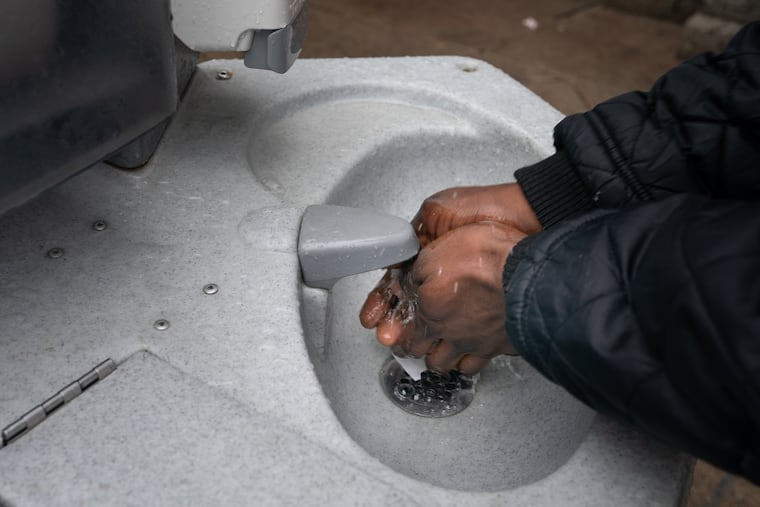Hygiene truck to deliver personal items to Philadelphia people experiencing homelessness
The plan is for a single, 16-foot used box truck (yet to be purchased) to be outfitted with product storage space, a small medical office, and outside sinks.

One of the many challenges created by the pandemic has been how best to rearrange services for low-income people, including those experiencing homelessness.
Food distribution, for example, has changed, with safe sites established throughout Philadelphia that limit contact.
Broad Street Ministry in Center City, in conjunction with partners Pheed Philly and Bloody Btches, is planning to roll out a hygiene truck this summer that will provide toiletries as well as portable sinks for those in need.
Before the pandemic, Broad Street Ministry, a faith-based organization that provides meals, mail, medical services, and other amenities for people experiencing homelessness, would host personal care days in which 300 to 400 people would show up to collect soap, toothbrushes, underwear, socks, condoms, razors, and other personal products.
“We’re no longer able to accommodate big crowds because of COVID-19,” said Nathalie Cerin, Broad Street Ministry’s personal care manager. “Now, we give people what they need on an emergency basis. But big personal care day is no longer happening.”
The so-called Community Hygiene Truck will be launched to remedy that.
The plan is for a single, 16-foot used box truck (yet to be purchased) to be outfitted with product storage space, a small medical office, and outside sinks, according to Nicole McDonald, director of corporate and community relations for Broad Street Ministry. During the pandemic, the ministry has set up hand-washing stations at its own South Broad Street site.
» READ MORE: New project helps LGBTQ people move from homelessness to housing
Touch-screen ordering systems will be arrayed outside the truck when it’s parked so people can request what they need.
As part of a two-year pilot, the truck will initially have two stops between 11:30 a.m. and 1:30 p.m. during the week: one day in Kensington at the public health organization Prevention Point, the other in South Philadelphia at the Southeast Asian Mutual Assistance Association Coalition (SEAMAAC), McDonald said, explaining that more days may be added.
The sites were chosen because they’re already known to people who are homeless as spots where food is distributed. During the pandemic, both Prevention Point and SEAMAAC, in association with Broad Street Ministry, have given out around 500,000 meals to as many as 700 people a day in a program known as Step Up to the Plate, according to Jose Benitez, executive director of Prevention Point.
“People are struggling out here and the truck is one more way to help take care of people’s health,” Benitez said. “If they can wash their hands, that’s always a better outcome for health.”
The total estimated cost of the Community Hygiene Truck is $600,000, McDonald said. In a statement, Broad Street Ministry noted that it’s receiving support from the Starbucks Foundation, Life Science Cares, Harmony BioScience, Penn Medicine, and Bio Passage. Donations are also welcome, McDonald said.
Bloody Btches will expand the truck’s inventory to include a wider variety of menstrual products, and will work with Pheed Philly, an advocacy group providing basics like food, water, and clothing to people who are homeless, McDonald said. Representatives from both agencies are expected to staff the truck along with people from Broad Street Ministry.
» READ MORE: Pennsylvania fixing system that mistakenly believed people with food stamps were shopping improperly
“This truck is important,” said Sarah Magazzo, cofounder of Pheed Philly, based in South Philadelphia. “While there are so many great resources throughout the city, many locations aren’t the easiest to get to, especially if you’re experiencing homelessness. The truck will meet under-served communities where they’re at, with enough of an inventory to build them a customized care package they can take away.”
Magazzo added that the truck will be designed by an as-yet unchosen local artist who’ll paint the vehicle with “a symbol of hope and positivity.”
Nayanka Paul, founder and team member of Bloody Btches, based in North Philadelphia, wants people to think of the truck as “a one-stop shop that’ll be accessible to them, and offer them what they need.”
McDonald of Broad Street Ministry said she’s unaware of anything like the hygiene truck in Philadelphia.
Similar attempts to address the health and well-being of people who are homeless have been undertaken in other cities.
» READ MORE: Philadelphia expects $42 million from new Biden initiative for people experiencing homelessness
Lava Mae, an organization that transformed old city buses into mobile showers and bathrooms, has been operating in San Francisco, Oakland, and Los Angeles since 2013.
And Haven of Hope on Wheels in Oroville, Calif., sends out a portable laundry as well as a shower.
In Philadelphia this summer, when the hygiene truck has its maiden voyage, someone will break a bottle of champagne on it to wish it a good trip, Magazzo said.
The hygiene truck will be popular, predicted William Stanley, 56, a formerly homeless man and advocate now living in North Philadelphia.
“That truck is something I’d have used in my 27 years on the street,” Stanley said. “I used to get my toiletries from Broad Street Ministry.
“With the corona[virus] now, people are spread out, being careful. That truck is a good idea.”
The Philadelphia Inquirer is one of more than 20 news organizations producing Broke in Philly, a collaborative reporting project on solutions to poverty and the city’s push toward economic justice. See all of our reporting at brokeinphilly.org.